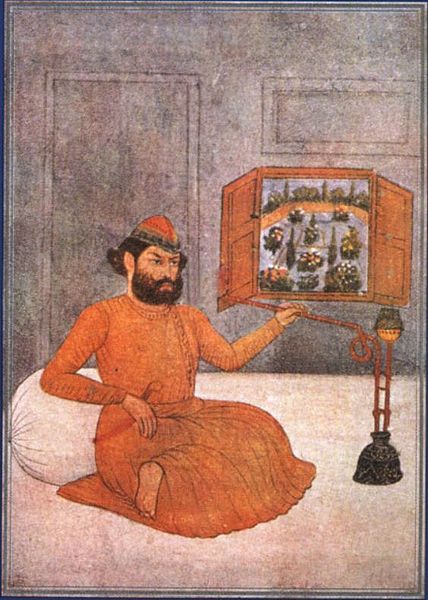FWP:
SETS == POETRY
The original verse by Nasikh to which Ghalib refers, and from which he borrows his second line, is:
shub'hah
nāsiḳh nahīñ kuchh mīr kī ustādī meñ
āp be-bahrah hai jo mutʿaqid-e mīr nahīñ
[there's no doubt at all, Nasikh,
about Mir's Ustad-ship
he himself is portionless/destitute, who is not a believer/follower of Mir]
Source: rashīd ḥasan ḳhāñ , intiḳhāb-e nāsiḳh (Delhi: Maktaba Jamia Ltd., 1972), p. 173.
In Ghalib's original ten-verse ghazal the ninth verse was the closing-verse that I've presented as {92,8x}, which Ghalib chose not to include in his divan. This present verse was the tenth, and just as Mihr says, there is a variant form of the first line that says of Mir, 'he is the Zuhuri of Rekhtah'-- a much punchier form of praise than the bland 'Ghalib, this is my creed/belief'. But the variant form is not a closing-verse, so perhaps when Ghalib chose to omit {92,8x} he also decided to re-work the present verse into a closing-verse.
Most of the other commentators don't have much to say about this verse except the usual prose paraphrase, but Nazm launches into a sweeping four-page discussion. His central point is duly repeated by his faithful follower, Shadan. As Shadan notes, the basic starting point of Nazm's critique is to show, with a barely concealed snideness, that neither Mir nor Ghalib was a 'real' Delhi person who spoke the 'real' language of Delhi-- so that it's not surprising that Ghalib praised Mir, since they were both provincials from the same home-place [vat̤an], Agra.
Nazm then goes on to explicate his own views about the virtues and flaws of Mir's (and Sauda's) ghazals. Since his discussion has a literary and historical interest of its own, I've translated almost all of his main points, omitting mostly the many examples. Nazm's views inspire me with many thoughts and observations, but I'll save them for another context, since his commentary doesn't have much to do with the verse itself.
This verse makes clear the depth of the admiration professed (and probably really felt, though not unambivalently) by Ghalib for Mir. The most conspicuous feature of the verse is in fact the use of two words from the religious domain, both from the same root: ʿaqīdah in the first line, and muʿtaqid in the second. This not only sets up a verbal and phonetic resonance, but also emphasizes the degree to which the verse is presenting itself as a kind of quasi-religious statement of faith.
However, compare {36,11}, for a far more tendentious and ambivalent 'tribute' to Mir. (And remember, a ghazal in any case is not a literary treatise.)

Hali:
In one gathering, he was praising Mir Taqi. Shaikh Ibrahim Zauq too was present; he gave priority to Sauda over Mir. Mirza said, 'I used to consider you a 'Mirian'/winner [mīrī], but now I've realized that you're a 'Saudaian'/madman [saudāʾī].
[mīrī : 'One who surpasses or outstrips another (in any business, or game, &c.); a winner (at play); —(among schoolboys) he that first comes to the master to say his lesson'. (Platts p.1105)]
[saudāʾī : 'Melancholic, atrabilarious; insane, mad; —an atrabilarian, a hypochondriac; a madman'. (Platts p.696)]
==Urdu text: Yadgar-e Ghalib, p. 97